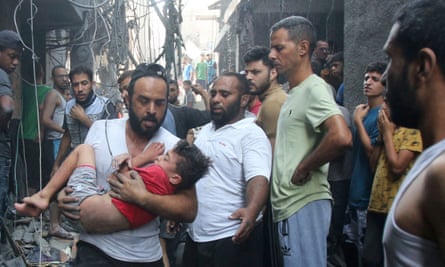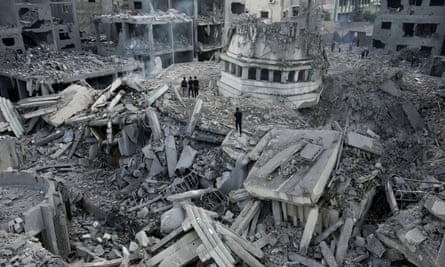Israel’s military has told 1.1 million residents of northern Gaza to relocate farther south within 24 hours, the UN has said, as expectations grow that Israel will launch a ground invasion in response to Saturday’s unprecedented attacks by Hamas.
Stéphane Dujarric, spokesperson for the UN secretary-general, told multiple news outlets that UN officials working in Gaza were told by the Israel Defence Forces (IDF) “that the entire population of Gaza north of Wadi Gaza should relocate to southern Gaza within the next 24 hours”, adding that this amounts to approximately 1.1 million people.
Dujarric said the same order applied to all UN staff and those sheltered in UN facilities – including schools, health centres and clinics. The UN agency for Palestinian refugees (UNRWA) is sheltering more than 60% of the 423,000 people displaced in recent days in the Gaza Strip.

It was not immediately clear how many people were currently located north of Wadi Gaza.
“The United Nations considers it impossible for such a movement to take place without devastating humanitarian consequences,” Dujarric said. “The United Nations strongly appeals for any such order, if confirmed, to be rescinded avoiding what could transform what is already a tragedy into a calamitous situation.”
Israel’s military did not immediately comment on the warning, which came as it amassed tanks near the Gaza border and pounded the enclave with airstrikes. But appearing to confirm a warning took place, Israel’s ambassador to the UN, Gilad Erdan, said: “The UN’s response to Israel’s early warning to the residents of Gaza is shameful.” Erdan said the UN should focus on condemning Hamas and supporting Israel’s right to self-defence.
Salama Marouf, head of the Hamas government media office, said the relocation warning was an attempt by Israel “to broadcast and pass on fake propaganda, aiming to sow confusion among citizens and harm our internal cohesion”.
The warning came after Iran’s foreign minister said the continuation of crimes against Palestinians would spark a response from “the rest of the axis”, as Israel continued bombing Gaza.
Hossein Amir-Abdollahian did not give further details, but the axis of resistance refers to an alliance among Iran, Palestinian militant groups, Syria, the Lebanese militant group Hezbollah and other factions.
Amid concerns about a widening of the conflict, Hamas called on Palestinians to rise up on Friday in protest against Israel’s bombardment of Gaza, urging Palestinians to march to East Jerusalem’s al-Aqsa mosque and clash with Israeli troops in the occupied West Bank.

Israel has been pounding Gaza for days in retaliation for the Hamas rampage that has killed at least 1,300 Israelis, according to public broadcaster Kan, the deadliest attack on civilians in Israeli history. More than 1,500 Palestinians, a third of them children, have been killed in the retaliatory strikes, according to Gaza’s health ministry, and there are widespread concerns about a humanitarian crisis in the enclave. The Israeli air force said on Thursday it had dropped 6,000 bombs on Gaza since Saturday.
Human Rights Watch on Thursday accused Israel of using white phosphorus munitions in operations in Gaza and Lebanon, saying the use of such weapons puts civilians at risk of serious and long-term injury.
Asked for comment on the allegations, Israel’s military said it was “currently not aware of the use of weapons containing white phosphorous in Gaza.” It did not provide comment on the rights watchdog’s allegations of their use in Lebanon.
White phosphorus munitions can legally be used on battlefields to make smoke screens, generate illumination, mark targets or burn bunkers and buildings, but it is considered an incendiary weapon under Protocol III of the Convention on the Prohibition of Use of Certain Conventional Weapons. The protocol prohibits using incendiary weapons against military targets located among civilians, although Israel has not signed it and is not bound by it.
A ground offensive in Gaza is likely to bring even higher casualties on both sides in brutal house-to-house fighting. Israel has mobilised an unprecedented 360,000 reservists, massed additional forces near the strip, and evacuated tens of thousands of nearby residents.
Scores of Israeli and foreign hostages were taken back to Gaza; Israel said it had identified 97 so far. Israeli ministers has said there will be no humanitarian break to its siege of the Gaza Strip until all its hostages are freed, amid growing concern over dwindling water, food and fuel supplies.
UN experts have condemned the Israeli bombardment as “collective punishment”, which is a war crime.
Iran’s foreign minister Amir-Abdollahian said the displacement of Palestinians and cutting water and electricity to the Gaza Strip were considered war crimes.
Speaking on television through a translator upon his arrival in Beirut, he said on Thursday: “The continuation of war crimes against Palestine and Gaza will receive a response from the rest of the axis. And naturally, the Zionist entity and its supporters will be responsible for the consequences of that.”
“Some western officials have questioned if there is an intention to open a new front against the Zionist entity. Of course, in light of the continuation of these circumstances that are war crimes,” he added.

Late on Thursday, Israel’s parliament approved Benjamin Netanyahu’s emergency unity government, including a number of centrist opposition lawmakers, with the prime minister warning of “difficult days ahead” but determined to achieve “complete victory”.
Lt Col Richard Hecht, an Israeli military spokesperson, told reporters that forces were preparing for a ground assault in Gaza but that the political leadership had not yet ordered one. Netanyahu has vowed to “crush and destroy” Hamas.
Israel’s bombing campaign has destroyed 752 residential and non-residential buildings, comprising 2,835 housing units, the UN says, citing numbers from the Gaza Ministry of Public Works and Housing. Another nearly 1,800 housing units have been damaged beyond repair and rendered uninhabitable, it said.
The US has pledged to send more arms to Israel ahead of the expected ground assault, as Antony Blinken, the US secretary of state, arrived in Tel Aviv to offer US backing to Israel “today, tomorrow, every day”.
He told the prime minister, Benjamin Netanyahu, on a visit to the region that Israel “may be strong enough on your own to defend yourself but, as long as America exists, you will never, ever have to. We will always be there by your side”.
Although Blinken offered unwavering support to Israel and condemned Hamas’s “reign of terror”, he also spoke of the Palestinian people’s “legitimate aspirations to live with equal measures of security, freedom, justice, opportunity and dignity”.
Blinken is expected to meet the Palestinian Authority president, Mahmoud Abbas, on Friday as well as visit key US allies Qatar, Saudi Arabia, Egypt and the United Arab Emirates – some with influence on Hamas, an Islamist group backed by Iran.
Blinken is to be joined in Israel on Friday by US defence secretary Lloyd Austin, who also planned to meet Netanyahu. The US military is placing no conditions on its security assistance to Israel, Austin said earlier, adding Washington expected Israel’s military to “do the right things” in its war against Hamas.
The presidents of the European Commission and parliament, Ursula von der Leyen and Roberta Metsola, will visit Israel on Friday to “express solidarity with the victims of the Hamas terrorist attacks, and meet with Israeli leadership”.
With Reuters